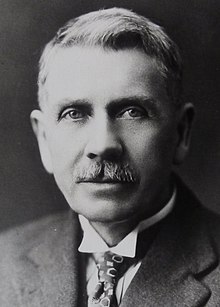Bill Veitch
|
The Honourable Bill Veitch |
|
|---|---|
 |
|
| 11th Minister of Railways | |
|
In office 13 December 1930 – 31 August 1931 |
|
| Prime Minister | George Forbes |
| Preceded by | William Taverner |
| Succeeded by | George Forbes |
| Member of the New Zealand Parliament for Wanganui |
|
|
In office 1911 – 1935 |
|
| Preceded by | James Thomas Hogan |
| Succeeded by | Joseph Cotterill |
| Personal details | |
| Born |
William Andrew Veitch 25 May 1870 Port of Menteith, Perthshire, Scotland |
| Died | 1 January 1961 (aged 90) Paraparaumu, New Zealand |
| Political party |
United Labour (1912–16) Liberal (1922–28) United (1928–35) Democrat (1935) National (1943) |
| Awards and honours |
King George V Silver Jubilee Medal, 1935 King George VI Coronation Medal, 1937 |
William Andrew (Bill) Veitch (25 May 1870 – 1 January 1961) was a New Zealand politician. He began his career in the labour movement, but was a strong opponent of socialism, and rejected the militant views held by many of his colleagues.
Veitch was born in Port of Menteith, a small town in Perthshire, Scotland. After receiving a basic education, he worked for the post and telegraph service until 1887. He then moved to New Zealand, briefly taking up gum digging before returning to telegraphs. In 1889, he joined the railways, eventually becoming an engine driver.
During his railway career, he became active in the rail-workers union, and in 1908, he became its president. In comparison to other unionists at the time, Veitch was relatively moderate in his views, but was still dissatisfied with the government's response to various grievances. Believing that workers' goals were better served by political action than strikes, Veitch contested the Wanganui seat in the 1911 election, and defeated the incumbent MP, James Thomas Hogan. Despite there being two labour-aligned parties contesting the election, Veitch chose to stand as an independent Labourite.
In Parliament, Veitch initially voted against the Liberal government of Joseph Ward. This was part agreement he had made with the opposition Reform Party, which had offered him support in his election bid. After discharging this obligation, however, he immediately became a Liberal Party supporter, voting in favour of Ward only two days later. He considered joining the Liberal Party, but when the new United Labour Party (ULP) was founded in 1912, Veitch joined that instead.
The following year, when the ULP agreed to merge with the Socialist Party to form the Social Democratic Party, Veitch was among those who rejected the move, and continued to work under the ULP banner. His primary concern with the new Social Democrats were clauses which required the party to support strikes, which Veitch believed were ineffective and unnecessarily disruptive to society. Most of the ULP dissenters were eventually re-united with the Social Democrats when the modern Labour Party was formed, but Veitch remained in Parliament as an independent. In 1917, he unsuccessfully contested the Wanganui mayoralty.
...
Wikipedia
